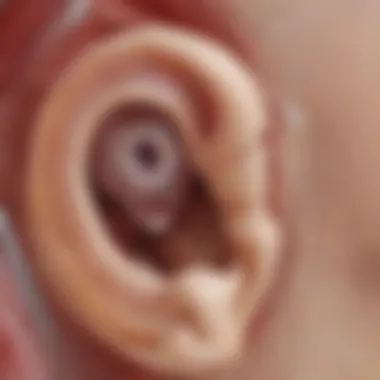Unraveling the Intricacies of Meniere's Disease: Symptoms, Causes, and Treatments Explored


Understanding Meniere's Disease
This article embarks on a comprehensive exploration of Meniere's disease, a perplexing disorder that affects the inner ear and manifests through symptoms like vertigo, hearing loss, and tinnitus. By delving into the intricate details of this condition, readers will gain a profound understanding of its complexities.
Symptoms
Meniere's disease presents a challenging array of symptoms, including recurring episodes of vertigo, fluctuating hearing loss, tinnitus or ringing in the ear, and a sensation of fullness in the affected ear. These symptoms can be debilitating and have a significant impact on the quality of life for individuals battling this condition.
Causes
The exact cause of Meniere's disease remains elusive, with theories suggesting a combination of factors such as fluid buildup in the inner ear, abnormal immune response, viral infections, and genetic predispositions. Understanding the potential triggers and mechanisms behind this disorder is crucial for effective management and treatment.
Diagnosis
Diagnosing Meniere's disease involves a comprehensive evaluation of medical history, symptom analysis, and various tests, including audiometry, balance testing, and imaging studies. Differentiating Meniere's disease from other inner ear disorders is essential to develop a targeted treatment plan tailored to the individual patient.
Treatment Options
Managing Meniere's disease typically involves a multidisciplinary approach aimed at alleviating symptoms, preventing episodes, and improving quality of life. Treatment options may include lifestyle modifications, medication therapy, vestibular rehabilitation, and in severe cases, surgical interventions. Discussing the benefits and risks of each treatment modality with a healthcare provider is essential for optimal management.
By delving into the realm of Meniere's disease from symptoms to treatment options, this article provides a comprehensive guide for individuals seeking a deeper understanding of this complex inner ear disorder.
Introduction
Meniere's disease is a complex and debilitating inner ear disorder that poses significant challenges to those affected by it. This article serves as a comprehensive guide to understanding Meniere's disease, shedding light on its symptoms, causes, diagnosis, and treatment options. By delving into the intricacies of this condition, readers will develop a deeper awareness of its impact on individuals' lives and the importance of effective management strategies.
Defining Meniere's Disease
Overview of Meniere's Disease
At the core of Meniere's disease lies a disruption in the inner ear's balance system, leading to symptoms like vertigo, hearing loss, and tinnitus. This section offers a detailed exploration of how Meniere's disease manifests, emphasizing the challenges it presents to medical professionals and patients alike. Understanding the overall picture of Meniere's disease is crucial for recognizing the complexity of its symptoms and their implications.
History of Meniere's Disease
The historical perspective of Meniere's disease provides valuable insights into the evolution of its diagnosis and management over time. By examining the milestones in understanding this disorder, we can appreciate the progress made in treating Meniere's disease and the ongoing quest for improved therapies. Recognizing the historical context of Meniere's disease is essential for guiding current research and enhancing patient care.
Epidemiology of Meniere's Disease
Epidemiological studies on Meniere's disease play a critical role in determining its prevalence, incidence, and risk factors. Analyzing the demographic patterns of this condition enables healthcare professionals to tailor treatments more effectively and allocate resources where they are most needed. Exploring the epidemiology of Meniere's disease enhances our understanding of its public health impact and the challenges it poses to healthcare systems.
Symptoms of Meniere's Disease
Vertigo
Vertigo stands out as one of the hallmark symptoms of Meniere's disease, causing dizziness and a sensation of spinning motion. Understanding the mechanisms behind vertigo and its impact on daily functioning is essential for individuals grappling with this distressing symptom. Addressing vertigo in the context of Meniere's disease is crucial for promoting symptom management and improving patients' quality of life.
Hearing Loss


Meniere's disease often results in fluctuating hearing loss, affecting individuals' ability to communicate and engage with their surroundings. Exploring the nuances of hearing loss in the context of this condition sheds light on the challenges faced by patients and the importance of prompt intervention. Recognizing the impact of hearing loss on individuals with Meniere's disease is key to implementing tailored treatment strategies.
Tinnitus
The persistent ringing or buzzing sounds in the ear, known as tinnitus, significantly impact the quality of life for individuals with Meniere's disease. Examining the characteristics of tinnitus and its link to inner ear dysfunction offers valuable insights into the multifaceted nature of this symptom. Managing tinnitus effectively is a critical aspect of caring for individuals with Meniere's disease and improving their overall well-being.
Ear Pressure
Ear pressure, often accompanied by a sensation of fullness or congestion, is a common complaint among individuals with Meniere's disease. Understanding the origins of ear pressure and its association with inner ear pathology is essential for diagnosing and managing this symptom effectively. Addressing ear pressure as part of the broader symptom profile of Meniere's disease enhances our ability to provide comprehensive care for affected individuals.
Causes of Meniere's Disease
Fluid Imbalance in Inner Ear
Meniere's disease is closely linked to disturbances in fluid balance within the inner ear, impacting sensory perception and balance control. Exploring the role of fluid imbalance in triggering Meniere's symptoms provides a foundational understanding of the disorder's pathophysiology. Addressing fluid imbalance as a primary cause of Meniere's disease contributes to targeted treatment approaches and management strategies tailored to individual needs.
Viral Infections
Viral infections have been proposed as potential triggers for Meniere's disease, with certain viruses implicated in inner ear inflammation and dysfunction. Examining the relationship between viral infections and Meniere's disease pathogenesis sheds light on the immune response mechanisms involved. Understanding the role of viral infections in the onset and progression of Meniere's disease informs treatment decisions and preventive measures aimed at reducing symptom severity.
Genetic Factors
Genetic factors play a significant role in predisposing individuals to Meniere's disease, influencing susceptibility to inner ear abnormalities and sensory disturbances. Investigating the genetic underpinnings of Meniere's disease informs our understanding of its hereditary patterns and potential targeted therapies. Recognizing the impact of genetic factors in Meniere's disease pathophysiology enhances personalized approaches to treatment and management, optimizing outcomes for affected individuals.
Autoimmune Response
An overactive autoimmune response has been implicated in the development of Meniere's disease, leading to inflammation and damage to inner ear structures. Exploring the immune-mediated component of this disorder offers insights into the complex interplay between the immune system and inner ear function. Addressing autoimmune factors in the context of Meniere's disease management is crucial for identifying targeted immunomodulatory strategies and improving long-term outcomes for affected individuals.
Diagnosis and Testing
Diagnosis and testing play a pivotal role in the comprehensive understanding of Meniere's disease. These processes are crucial in identifying the presence of the condition and determining appropriate treatment strategies. By conducting thorough diagnostic procedures, healthcare providers can accurately assess the severity of symptoms and differentiate Meniere's disease from other similar conditions, ensuring patients receive tailored care. Understanding the diagnostic phase is essential for individuals experiencing symptoms associated with Meniere's disease, as it sets the foundation for managing the condition effectively.
Diagnostic Procedures
Audiometry
Audiometry serves as a fundamental diagnostic tool in evaluating hearing function in individuals with Meniere's disease. This procedure measures the patient's hearing sensitivity across various frequencies, providing valuable insights into the extent of hearing loss associated with the condition. Audiometry is instrumental in identifying specific patterns of hearing impairment characteristic of Meniere's disease, aiding healthcare professionals in formulating personalized treatment plans. While audiometry offers detailed information on auditory function, its limitations include the inability to assess other symptoms such as vertigo or tinnitus, highlighting the need for a comprehensive diagnostic approach.
Electronystagmography (ENG)
Electronystagmography (ENG) is a specialized test used to evaluate the function of the vestibular system, responsible for balance and spatial orientation. By monitoring eye movements during specific stimulations, ENG helps detect abnormalities in the inner ear linked to Meniere's disease. This non-invasive procedure provides valuable data on vestibular function, assisting physicians in determining the underlying cause of vertigo and balance issues. Despite its efficacy in diagnosing vestibular disorders, ENG may have limitations in pinpointing the exact origin of symptoms, necessitating supplementary tests for a definitive diagnosis.
Magnetic Resonance Imaging (MRI)
Magnetic Resonance Imaging (MRI) is a sophisticated imaging technique employed to assess the internal structures of the head and neck, including the inner ear. In the context of Meniere's disease, MRI plays a critical role in ruling out alternative causes of symptoms, such as acoustic neuroma or structural abnormalities. By generating detailed anatomical images, MRI enables healthcare providers to visualize potential lesions or irregularities that could contribute to auditory and vestibular disturbances. While MRI is highly effective in identifying anatomical variations, its limitations lie in the inability to capture functional dynamics of the inner ear, requiring complementary tests for a comprehensive diagnostic evaluation.
Differential Diagnosis
Differential diagnosis is crucial in distinguishing Meniere's disease from similar conditions that share overlapping symptoms, ensuring accurate treatment allocation and management. By assessing the distinctive features of Meniere's disease in comparison to other disorders, healthcare professionals can effectively navigate diagnostic ambiguities and streamline the care pathway for individuals experiencing vestibular and auditory abnormalities. Understanding the nuances of differential diagnosis is imperative in confirming the presence of Meniere's disease and preventing misdiagnosis, ultimately enhancing patient outcomes.


Meniere's Disease vs. Vestibular Migraine
The differential diagnosis between Meniere's disease and vestibular migraine involves analyzing the characteristic symptoms of each condition to make a clear distinction. While both disorders manifest with episodes of vertigo and nausea, Meniere's disease typically presents with sensorineural hearing loss and tinnitus, distinguishing it from vestibular migraine, which primarily focuses on migraine-related neurological symptoms. By identifying these distinct symptom patterns, healthcare providers can stratify patients based on their clinical presentation and tailor treatment approaches accordingly, optimizing therapeutic outcomes.
Meniere's Disease vs. Labyrinthitis
In differentiating Meniere's disease from labyrinthitis, clinicians scrutinize the temporal progression and nature of symptoms exhibited by patients. Labyrinthitis is characterized by acute inflammation of the inner ear, leading to sudden onset vertigo, nausea, and hearing loss, often accompanied by nystagmus. In contrast, Meniere's disease features recurrent episodes of vertigo, fluctuating hearing loss, and tinnitus, without associated systemic infections or inflammatory processes. By discerning between these distinct clinical profiles, healthcare providers can accurately diagnose the underlying condition and implement targeted management strategies suited to each individual's needs.
Meniere's Disease vs. Acoustic Neuroma
The differential diagnosis of Meniere's disease and acoustic neuroma necessitates a comprehensive evaluation of auditory and vestibular symptoms alongside radiological imaging studies. While both conditions can manifest with sensorineural hearing loss and vestibular disturbances, acoustic neuroma presents with a distinct pattern of unilateral hearing loss, tinnitus, and imbalance, often associated with the presence of a vestibular schwannoma. Contrarily, Meniere's disease showcases characteristic episodic vertigo, sensorineural hearing loss, and tinnitus of fluctuating nature, accentuating the distinctions in symptomatology and pathophysiology between these two entities. By discerning these unique features, healthcare providers can accurately diagnose and manage patients presenting with auditory and vestibular complaints, ensuring optimal treatment outcomes and patient satisfaction.
Treatment Options
Treatment options are a pivotal aspect of this article as they delve into the various interventions available for managing Meniere's disease. Understanding the treatment options is crucial for individuals grappling with the challenges posed by this complex condition. By exploring the diverse methods of addressing Meniere's disease, readers can gain insights into how medical advancements have enhanced the quality of care provided for patients.
Conservative Management
Dietary Modifications
Dietary modifications play a crucial role in the conservative management of Meniere's disease. By adjusting dietary habits, individuals can potentially alleviate symptoms and improve their overall well-being. Emphasizing low-sodium diets and the reduction of caffeine and alcohol consumption are common recommendations to manage symptoms effectively. Although dietary modifications require discipline, the potential reduction in vertigo and other symptoms makes it a popular choice among patients seeking non-invasive treatment.
Lifestyle Changes
Implementing lifestyle changes is another key element in the conservative management of Meniere's disease. Engaging in regular exercise, getting an adequate amount of sleep, and avoiding triggers such as stress and fatigue can contribute significantly to symptom reduction. The emphasis on a healthy lifestyle not only helps in managing Meniere's disease symptoms but also promotes general well-being and quality of life.
Stress Management
Stress management techniques are essential in coping with Meniere's disease. Stress can exacerbate symptoms, leading to increased discomfort and disruptions in daily life. Incorporating stress relief practices such as mindfulness, meditation, or yoga can help individuals better manage the emotional and physical challenges associated with Meniere's disease. While stress management may require dedication and effort, its impact on symptom reduction and overall quality of life is substantial.
Medical Interventions
Medications
The use of medications is a significant aspect of medical interventions for Meniere's disease. Prescription drugs such as diuretics, anti-vertigo medications, and corticosteroids are commonly prescribed to alleviate symptoms and manage fluid levels in the inner ear. Medications offer patients a non-invasive approach to symptom management, providing relief from vertigo, tinnitus, and hearing loss. However, it is important to consider potential side effects and interactions when undergoing medication therapy.
Intratympanic Injections
Intratympanic injections are a targeted medical intervention for Meniere's disease that involves delivering drugs directly into the middle ear. This approach allows for a more localized and effective treatment, reducing the risk of systemic side effects associated with oral medications. Intratympanic injections are particularly beneficial for individuals who may not respond well to oral medications or those seeking a more direct and efficient therapy option.
Vestibular Rehabilitation
Vestibular rehabilitation is a specialized therapy that focuses on improving balance and reducing dizziness in individuals with vestibular disorders like Meniere's disease. Through a tailored exercise regimen and techniques to enhance vestibular function, patients can experience improved stability and reduced vertigo episodes. Vestibular rehabilitation offers long-term benefits by strengthening compensatory mechanisms within the body and improving overall vestibular function.
Surgical Options
Endolymphatic Sac Decompression Surgery


Endolymphatic sac decompression surgery is a surgical procedure aimed at alleviating fluid pressure in the inner ear to reduce symptoms of Meniere's disease. By creating a drainage pathway for excess fluid, this surgery can help restore balance and alleviate vertigo episodes. While the procedure can provide significant relief for some individuals, it is important to weigh the potential risks and benefits before opting for surgical intervention.
Labyrinthectomy
Labyrinthectomy is a surgical option for individuals with severe and persistent Meniere's disease symptoms that are unresponsive to conservative measures. This procedure involves removing a portion of the inner ear to eliminate vertigo and balance issues. Labyrinthectomy is considered a last resort when other treatment modalities have not been effective in managing symptoms, and it is crucial to discuss the potential outcomes and risks with a healthcare provider.
Vestibular Nerve Section
Vestibular nerve section is a surgical intervention that involves severing the vestibular nerve to address debilitating vertigo in Meniere's disease. By disrupting the connection between the inner ear and the brain's balance centers, this procedure aims to reduce vertigo symptoms significantly. Vestibular nerve section is generally reserved for individuals with severe vertigo refractory to other treatments and requires thorough evaluation and consideration due to potential effects on balance and spatial orientation.
Living with Meniere's Disease
Living with Meniere's Disease is a crucial aspect that deserves significant attention in this comprehensive guide. Individuals grappling with this ailment often face a myriad of challenges that impact their daily lives. From coping with unpredictable vertigo attacks to navigating hearing loss and tinnitus, the repercussions of Meniere's Disease can be overwhelming. Understanding how to manage these symptoms and maintain a semblance of normalcy is paramount for those suffering from this condition.
Coping Strategies
Support Groups
Exploring the realm of Support Groups unveils a pivotal resource for individuals contending with Meniere's Disease. These communal platforms foster a sense of camaraderie among members undergoing similar struggles. The shared experiences and collective wisdom exchanged within Support Groups create a nurturing environment that alleviates feelings of isolation and offers practical tips for coping with the disease. The embracing nature of Support Groups serves as a cornerstone for emotional support and encouragement, instilling hope and perseverance in those navigating the challenges posed by Meniere's Disease.
Therapy and Counseling
Delving into the realm of Therapy and Counseling sheds light on the psychological aspect of managing Meniere's Disease. These therapeutic interventions provide individuals with a safe space to express their concerns, fears, and frustrations associated with the condition. Through guided sessions, individuals can develop coping mechanisms, resilience, and a positive mindset, essential for navigating the complexities of Meniere's Disease. Therapy and Counseling offer tailored support to address emotional distress, anxiety, and depression, fostering mental well-being and enhancing overall quality of life for individuals impacted by this condition.
Balance Training
Exploring the realm of Balance Training reveals a fundamental component in the holistic management of Meniere's Disease. These specialized exercises focus on enhancing proprioception, coordination, and vestibular function, essential for individuals experiencing vertigo and balance disturbances. Balance Training programs are designed to improve stability, reduce the frequency and severity of vertigo attacks, and enhance overall physical well-being. By honing balance and proprioceptive skills, individuals can regain a sense of control over their bodies, improving confidence and quality of life while navigating the challenges posed by Meniere's Disease.
Quality of Life
Unveiling the nuances of Quality of Life illuminates the profound impact Meniere's Disease can have on various aspects of daily living. From alterations in occupational roles to shifts in social interactions and emotional well-being, this condition exerts a multifaceted influence on an individual's quality of life. Understanding the strategies to mitigate these challenges and enhance overall well-being is essential for individuals grappling with the persistent symptoms of Meniere's Disease.
Work Adjustments
Embarking on an exploration of Work Adjustments underscores the importance of adapting occupational roles to accommodate the needs of individuals with Meniere's Disease. These modifications may include flexible work hours, ergonomic adjustments, or job restructuring to mitigate the impact of vertigo, hearing loss, and tinnitus on workplace performance. By implementing tailored Work Adjustments, individuals can sustain their professional engagement and productivity while navigating the challenges posed by Meniere's Disease.
Social Impact
Navigating the Social Impact of Meniere's Disease unveils the intricate dynamics that shape personal relationships, social participation, and community engagement. Individuals grappling with this condition may encounter barriers to social interactions, feelings of isolation, or stigma related to invisible symptoms such as vertigo and fatigue. Recognizing and addressing the social repercussions of Meniere's Disease are pivotal in fostering inclusive environments, promoting empathy, and enhancing social support networks for individuals on their journey towards holistic well-being.
Emotional Well-being
Delving into the realm of Emotional Well-being highlights the paramount importance of addressing the psychological welfare of individuals impacted by Meniere's Disease. The emotional toll of chronic illness, unpredictable symptoms, and lifestyle adjustments can significantly impact mental health and overall well-being. By prioritizing Emotional Well-being through self-care practices, mindfulness techniques, and seeking professional support when needed, individuals can cultivate resilience, emotional equilibrium, and a positive outlook despite the challenges posed by Meniere's Disease.
Research and Future Directions
In delving into the intricate realm of Meniere's Disease, understanding its complexities requires a forward-looking approach to research and future directions. The exploration into current studies concerning Meniere's provides a crucial roadmap for understanding the evolving landscape of this inner ear disorder. By shedding light on ongoing investigations and potential breakthroughs, this section plays an instrumental role in paving the way for advanced treatment modalities and enhanced patient outcomes. Highlighting the significance of continued research in unraveling the mysteries of Meniere's Disease underscores the commitment to innovation and progress in the medical field.
Current Studies on Meniere's Disease
- Exploring Novel Therapies: The pursuit of innovative treatment strategies through Exploring Novel Therapies offers promising avenues for addressing the complexities of Meniere's Disease. By venturing beyond traditional approaches, such as medication and surgery, this research avenue aims to revolutionize how we manage and alleviate the symptoms associated with this condition. The unique feature of Exploring Novel Therapies lies in its adaptive nature, constantly adapting to the dynamic needs of Meniere's patients, offering personalized and effective interventions tailored to individual experiences with the disease.
- Genetic Research: Genetic Research delves into the DNA-based underpinnings of Meniere's Disease, shedding light on the hereditary components that contribute to its onset and progression. By elucidating the genetic markers associated with this disorder, researchers can pinpoint potential risk factors and pave the way for more targeted therapeutic interventions. The advantage of Genetic Research lies in its potential to offer personalized treatment approaches, catering to the specific genetic makeup of each patient, thereby enhancing the efficacy and precision of management strategies.
- Impact of Autoimmune Factors: The Impact of Autoimmune Factors on Meniere's Disease underscores the intricate interplay between the immune system and inner ear dysfunction. By exploring how autoimmune responses can trigger or exacerbate Meniere's symptoms, researchers aim to uncover novel pathways for intervention and management. The unique feature of this research lies in its potential to target the underlying immune mechanisms contributing to the disease, opening new possibilities for immune-modulating treatments that address the root cause of Meniere's.
Challenges in Meniere's Research
- Complexity of Symptoms: The multifaceted nature of Meniere's Disease symptoms presents a formidable challenge in both diagnosis and treatment. The intricate interplay between vertigo, hearing loss, tinnitus, and ear pressure demands a comprehensive approach that accounts for the diverse ways in which these symptoms manifest and interact. While challenging, the Complexity of Symptoms offers a valuable opportunity for researchers to delve deeper into the underlying mechanisms of this disorder, unraveling its intricacies and paving the way for more targeted and effective interventions.
- Diversity of Patient Responses: Meniere's Disease exhibits a wide spectrum of patient responses, with individual experiences varying significantly in severity and progression. Understanding the diverse ways in which patients respond to treatment is essential for tailoring personalized care plans that address their unique needs and challenges. The key characteristic of Diversity of Patient Responses lies in its emphasis on individualized care, recognizing that a one-size-fits-all approach may not suffice in the complex landscape of Meniere's management.
- Integration of Multidisciplinary Approaches: Fostering collaboration across multiple disciplines is essential in tackling the multifaceted nature of Meniere's Disease. The Integration of Multidisciplinary Approaches brings together experts from various fields, including audiology, otolaryngology, neurology, and immunology, to pool their insights and expertise in developing comprehensive care strategies. By harnessing the collective knowledge and skills of diverse specialists, this approach ensures that patients receive holistic and well-rounded care that addresses the myriad dimensions of Meniere's, from diagnosis to treatment and beyond.







